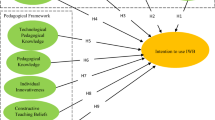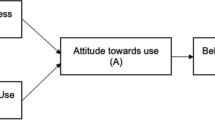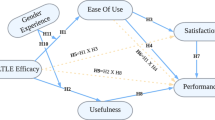Abstract
The aims of the current study are to identify the behavioral factors enabling students’ acceptance and use of a podcast aggregator that provides tips about contents taught in the classroom, as well as to investigate its impact on knowledge formation among Accounting Sciences undergraduate students from a Federal University in Southern Brazil, based on the Unified Theory of Acceptance and Use of Technology (UTAUT) and on Vygotsky’s Historical-Cultural Theory. Data were collected through the application of an on-site questionnaire comprising closed questions and through diagnostic evaluations based on Vygotsky’s theory. The Partial Least Squares Structural Equation Modeling (PLS-SEM) conducted in the SPSS v. 017 and SmartPLS v. 2.0 software, as well as the content analysis conducted in the NVivo software, were the data analysis techniques adopted in the current study. The current research is justified by the need of conducting studies based on education theories and on theoretical frameworks associated with technology acceptance in order to help better understanding to what extent technology contributes to cognitive development. According to the current results, it was possible concluding that students’ acceptance and use of the podcast aggregator in both investigated classes was motivated by aspects such as social influence and performance expectations.




Similar content being viewed by others
References
Al-Gahtani, S. S., Hubona, G. S., & Wang, J. (2007). Information technology (IT) in Saudi Arabia: Culture and the acceptance and use of IT. Information and Management, 44(8), 681–691.
Alshahrani, H. A., & Walker, D. A. (2017). Validity, reliability, predictors, moderation: The UTAUT model revisited. General Linear Model Journal, 43(2), 23–34.
Bardin, L. (2011). Análise de conteúdo (Vol. 70). Lisboa: Edições.
Basoglu, E. B., & Akdenir, O. (2010). A comparison of undergraduate students’ English vocabulary learning: Using Mobile phones and flash cards. The Turkish Online Journal of Educational Technology, 9(3), 230–234.
Chin, W. W. (1998). The partial least squares approach for structural equation modeling. In G. A. Marcoulides (Ed.), Modern Methods for Business Research (Vol. 1, pp. 295–336). London: Lawrence Erlbaum Associates.
Chiu, C. M., & Wang, E. (2008). Understanding web-based learning continuance intention: The role of subjective task value. Information & Management, 45(3), 194–201.
Davis, F. D., Bagozzi, R. P., & Warshaw, P. R. (1992). Extrinsic and intrinsic motivation to use computers in the workplace. Journal of Applied Social Psychology, 22(4), 1111–1132.
Diaz, M. C., & Loraas, T. (2010). Learning new uses of technology while on an audit engagement: Contextualizing general models to advance pragmatic understanding. International Journal of Accounting Information Systems, 11(6), 61–77.
Eidt, N. M., & Tuleski, S. C. (2007). Discutindo a medicalização brutal em uma sociedade hiperativa. In: M. E. W. Meira, & M. G. D. Facci (Orgs.). Psicologia Histórico-Cultural: contribuições para o encontro entre a subjetividade e a educação, São Paulo: Casa do Psicólogo, 10 (35), 221–248.
Fava, R. (2009). O ensino na sociedade digital. Recuperado em 20 ago. 2019, de: http://semesp.org.br/portal/index.php.
Gachago, D., Livingston, C., & Ivala, E. (2016). Podcasts: A technology for all? British Journal of Educational Technology, 47(5), 859–872.
Gall, J., Borg, W., & Gall, M. (2003). Educational research: An introduction (7a ed.). Boston: Pearson Education.
Galuch, M. T. B., & Sforni, M. S. D. F. (2009). Aprendizagem conceitual e apropriação da linguagem escrita: contribuições da teoria histórico-cultural. Estudos e Avaliação Educacional, 20(42), 111–124.
Gupta, B., Dasgupta, S., & Gupta, A. (2008). Adoption of ICT in a government Organization in a Developing Country: An empirical study. The Journal of Strategic Information Systems, 17(2), 140–154.
Hair, J. F., Black, W. C., Babin, B. J., Anderson, R. E., & Tatham, R. L. (2009). Análise multivariada de dados (6a ed.). Porto Alegre: Bookman.
Henseler, J., Ringle, C., & Sinkovics, R. (2009). The Use of Partial Least Squares Path Modeling in International Marketing, 10, 1108–1474.
Internacional Accounting Standards Board – IASB (2011). IFRS Blue Book. London: IASB.
Jung, I., & Lee, Y. (2015). YouTube acceptance by university educators and students: A cross-cultural perspective. Innovations in Education and Teaching International, 52(3), 243–253.
Krashen, S. (1989). We acquire vocabulary and spelling by reading: Additional evidence for the input hypothesis. Modern Language Journal, 73(4), 440–464.
Machado, E. A. (2014). Desempenho acadêmico e satisfação dos estudantes na modalidade EaD: um estudo comparativo entre concluintes dos cursos de Ciências Contábeis e Administração (Tese de Doutorado). Faculdade de Economia, Administração e Contabilidade, Universidade de São Paulo, São Paulo, SP, Brasil.
Malhotra, N. (2001). Pesquisa de marketing (3a ed.). Porto Alegre: Bookman.
Mondini, V. D. (2017). Relações entre Fatores de Aceitação da Tecnologia e a Retenção de Estudante em Curso Online (Tese de Doutorado). Universidade Regional de Blumenau – FURB. Blumenau, SC, Brasil.
Moore, G. C., & Benbasat, I. (1991). Development of an instrument to measure the perceptions of adopting an information 118 journal of general management research technology innovation. Information Systems Research, 2(3), 192–222.
Nganga, C. S. N. (2015). Aceitação do uso de recursos tecnológicos pelos docentes de pós-graduação em Contabilidade (Dissertação de Mestrado). Universidade Federal de Uberlândia, Uberlândia, MG, Brasil.
Nogueira, D. R. (2014). Vento da mudança: estudo de caso sobre a adoção de ambientes virtuais no ensino presencial em contabilidade (Tese de Doutorado). Faculdade de Economia, Administração e Contabilidade, Universidade de São Paulo, São Paulo, SP, Brasil.
Ostermann, F., & Cavalcanti, J. H. (2010). Teorias de Aprendizagem: texto introdutório. Porto Alegre: UFRGS.
Park, J. K., Yang, S., & Lehto, X. (2007). Adoption of mobile technologies for chinese consumers. Journal of Electronic Commerce Research, 8(3), 196–206.
Popova, A. A., Kirschner, P. A., & Joiner, R. (2014). Effects of primer podcasts on stimulating learning from lectures: How do students engage? British Journal of Educational Technology, 45(2), 330–339.
Rambusch, J. (2006). Situated Learning and Galperin’s Notion of Object-Oriented Activity. Proceedings of the Annual Conference of the Cognitive Science Society, Mahwah, New York, 28.
Ringle, C., Silva, D., & Bido, D. S. (2014). Modelagem de Equações Estruturais com utilização do Smartpls. Revista Brasileira de Marketing, 13(2), 54–71.
Saragoça, V. A. M., & Domingues, M. J. C. S. (2013). Fatores que influenciam o Uso e a Intenção de Uso das Tecnologias: um estudo em uma Universidade. Anais do Encontro da ANPAD – EnAnpad, Rio de Janeiro, RJ, Brasil, 33.
Shin, D. H. (2009). Towards an understanding of the consumer acceptance of mobile wallet original research article. Computers in Human Behavior, 25(6), 1343–1354.
Silva, C. C. R., Porto, M. D., & Medeiros, W. A. (2017). A Teoria Vygotskyana e a Utilização das Novas Tecnologias no Ensino Aprendizagem: uma reflexão sobre o uso do celular. Revista online de Magistro de Filosofia, 10(21), 120–130.
Tenenhaus, M., Vinzi, V., Chatelin, Y., & Lauro, C. (2005). PLS path modeling. Computacional statistics & Data Analysis, 48(1), 159–205.
Thompson, R. L., Higgins, C. A., & Howell, J. M. (1991). Personal computing: Toward a conceptual model of utilization. MIS Quarterly, 15(1), 125–143.
Venkatesh, V., Morris, M. G., Davis, G. B., & Davis, F. D. (2003). User acceptance of information technology: Toward a unified view. MIS Quarterly, 27(3), 425–478.
Venkatesh, V., Thong, Y. L. J., & Xu, X. (2012). Consumer acceptance and use of information technology: Extending the unified theory of acceptance and use of technology. MIS Quarterly, 36(1), 157–178.
Visentini, M. S., Bobsin, D., & Rech, I. (2008). Ampliando as considerações sobre o uso da Tecnologia: o estado da arte do UTAUT. Anais do Encontro da ANPAD – EnAnpad, Rio de Janeiro, RJ, Brasil, 32.
Vygotsky, L. S. (2007). A formação social da mente. São Paulo: Martins Fontes.
Wong, L., Tatnall, A., & Burgess, S. (2014). A framework for investigating blended learning effectiveness. Education + Training, 56(2/3), 233–251.
Yang, S., Hsu, Y. C., & Tan, S. (2010). Predicting the determinants of users’ intentions for using YouTube to share video: Moderating gender effects. Cyberpsychology, Behavior, And Social Networking, 13(2), 141–152.
Yurong, Y., & Murphy, L. (2007). Remote electronic voting systems: An exploration of voters’ perceptions and intention to use. European Journal of Information Systems, 16(2), 106–120.
Author information
Authors and Affiliations
Corresponding author
Additional information
Publisher’s note
Springer Nature remains neutral with regard to jurisdictional claims in published maps and institutional affiliations.
Appendices
Appendices
Rights and permissions
About this article
Cite this article
Martins, A.S.R., Quintana, A.C. & de Gomes, D.G. Factors enabling the acceptance and use of a podcast aggregator in accounting education. Educ Inf Technol 25, 5427–5449 (2020). https://doi.org/10.1007/s10639-020-10232-1
Received:
Accepted:
Published:
Issue Date:
DOI: https://doi.org/10.1007/s10639-020-10232-1




